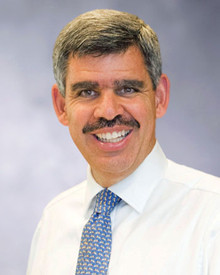In a rapidly changing world, the IMF needs member country support

There is little doubt in my mind that if the IMF didn’t exist today there would be loud calls to create it.
Without the IMF, there would be no true lender of last resort at the international level at a time when crises can strike a country suddenly and infect other economies. Countries would need a higher level of inefficient self-insurance, including holding very large amounts of costly international reserves. They would be more tempted to weaponize economic tools in the pursuit of narrow interests. There would be less information sharing and less scope to coordinate economic policy to maintain global growth and stability.
Markets would be less orderly and efficient. Participants would miss the information, analysis, and data contained in the IMF’s country and regional reports, not to mention the highly anticipated periodic releases of theWorld Economic Outlook, Fiscal Monitor, and Global Financial Stability Report. They would lack the third-party validation the Fund provides on individual countries’ policies, as well as the important catalytic role of its lending.
All this would likely lead to greater risks of both government and market failures and a higher incidence of policy mistakes and market accidents—thereby eroding the ability of individual countries to generate high and inclusive growth and safeguard financial stability. And, remember, these risks are already elevated because of the current set of challenges facing the global economy (see “The IMF Today and Tomorrow” in this issue of F&D).
If it were to be invented today, how would the IMF compare with what we have known for the past 75 years? It would retain many of the structural attributes its founders envisioned. With a universal membership and a high-caliber staff, it would continue to fulfill its core functions: monitoring the well-being of individual economies and the world economy, lending to countries in need, helping governments build the capacity to shape sound economic and financial policies, and serving as a forum for discussion.
But it should, can, and must do more—being more of a leader in, and facilitator of, the orderly adaptation and transformation of the international system. To do that, it needs to devote more attention to how its staff is organized; how issues such as technology, social injustice, and sustainability are incorporated into its core activities; and how its executive board, management, and staff interact. None of this would achieve its aim if member countries didn’t also step up to their responsibilities at both the individual and collective levels.
A revamped IMF would have higher quotas to back its activities, together with modernized distribution among member countries and greater access to borrowed financial resources. It would maintain a range of lending facilities to meet the different needs of its member countries. It would focus on its core competencies while being mindful of the need to take into account the effects of other macrocritical issues, such as climate change. It would collaborate with other multilateral and regional agencies. And its “first among equals” status on the multilateral stage would be a natural consequence of its strong reputation, along with the Bank for International Settlements, as the most efficient, technocratic, and effective international organization.
Keeping pace
That said, the world should also be more sensitive to certain aspects of the IMF’s structure and operations that limit its effectiveness, hamper its credibility, and unduly challenge its reputation. These are areas that require attention today if the IMF is to keep up with significant changes in the global economy that are rendered even more complex by advances in artificial intelligence and big data, changing country power structures, a generalized loss of trust in institutions and expert opinion, changing economic and financial relationships at both the national and international levels, and forces favoring global fragmentation.
The IMF has already demonstrated its ability to reinvent itself in the wake of the global financial crisis, which exposed major lapses in its operations. In the area of surveillance, it has strengthened early warning approaches and has paid somewhat greater attention to social and sustainability concerns. In lending, it has introduced new financing instruments, with higher, more front-loaded access and mechanisms for more rapid disbursement of funds. It has shifted some of the emphasis toward conditionality that tries to take into account final outcomes and not just policy inputs.
In its governance and other associated adaptations, it has given developing economies a somewhat greater voice and representation, included the Chinese currency in the special drawing rights basket, and enhanced risk management. It has expanded internal and external communications and reinvigorated its internal watchdog, the Independent Evaluation Office (IEO).
Even with all these advances, the IMF recognizes the need for further change. Management and staff have stressed the need to progress further on several initiatives, including expanding the Fund’s financial capabilities consistent with the demands that could well be placed on it. And to quote from a 2018 IEO report on IMF governance, “accountability and representation have continued to raise concerns which, if unaddressed, would affect the IMF’s legitimacy and, ultimately, effectiveness.”
But in an increasingly multipolar world with deep but changing financial
interconnectivity, there is an urgent need to do more at three levels—
institutional, national, and global.
At the institutional level, the IMF’s resources and expertise are still too heavily tilted in favor of economics and policy, as opposed to society and the impact of financial markets. Nonbank financial and social links to economic progress are still lagging, often viewed too much as an afterthought. Behavioral science and decision-making insights are not employed frequently enough to support the transition from what’s desirable to what’s feasible and ultimately effective. There will be little progress in these areas without deepening further cognitive diversity in areas such as gender, educational qualifications, professional experiences, and cultural background.
This transition also requires better incorporation of governance, social equity, and justice issues. It means greater evenhandedness, as the founders intended, in the approach to both deficit and surplus countries. It also entails being more open to learning from mistakes, be they persistent forecasting errors (such as excessive growth optimism in the aftermath of the global financial crisis), partially designed programs (including insufficient attention to the costs and risks of extreme austerity), excessive capture by major shareholders, or inadequate focus on how persistent debt overhangs can pull the rug from under a country’s growth momentum.
Member countries can help by being more open to the role of the IMF as a trusted advisor. They should more seriously consider the risks of spillovers and spillbacks associated with narrow policy approaches. Should they need to borrow, they must resist the inclination to wait until the very last minute to approach the IMF, and they must be more active and explicit in taking ownership of both the design and implementation of the adjustment and reform programs supported by Fund resources.
Collectively, IMF members should take bolder and more decisive steps to implement a merit-based (rather than nationality-based) approach to the selection of its managing directors and deputy managing directors, doing a lot more—and quickly—to give a proper voice and representation to developing economies (particularly relative to European countries) and moving more swiftly to enhance the lending capacity of the IMF. Further delays in these areas increase the probability of financial crises, persistently low and insufficiently inclusive growth, further erosion of institutional credibility and standing, and the fragmentation of the international system.
The configuration and functioning of the global economy have changed greatly in the 75 years since the creation of the Bretton Woods institutions. While some may correctly point to instances where the IMF changed either too slowly or only in response to crises, overall the IMF has been among the most agile of the multilateral institutions when it comes to evolving its operational practices in response to new realities on the ground. With technological innovations and different power and market structures turbocharging change, the institution must adapt even faster if it is to fulfill its important role in the international system—one that is central to the well-being of the vast majority of people in its member countries.
Finding the right balance
In my first week at the Fund as a young full-time economist back in the summer of 1983, I was struck by the notion that the IMF can be uniform in its treatment of member countries while also being sensitive to case-by-case considerations. During my 15-year career there, I saw this applied in practice. It wasn’t always easy to strike the right balance, especially when political issues and outmoded mind-sets and entitlements got in the way. But doing so on the basis of the staff and management’s agile judgment, commitment, and timely responses proved critical for success.
Striking the right balance will become even more important for the IMF as global economic transformations accelerate, technological innovations change not just what we do but how we do things, the politics of anger interact with national economic policy management, and cross-country economic and financial links face greater fragmentation pressure. It will require the type of self-disruption that most institutions find hard to do well. But it will be much better than becoming less relevant, less impactful, and less respected.
The IMF’s committed staff realizes this perhaps better than anyone. Their willingness to accelerate their orderly and beneficial self-disruption is considerable. With visionary leadership, they have the ability to respond, and do so on offense rather than from a position of weakness—but they won’t be successful without empowering actions on the part of their shareholders, member countries.
Opinions expressed in articles and other materials are those of the authors; they do not necessarily reflect IMF policy.






